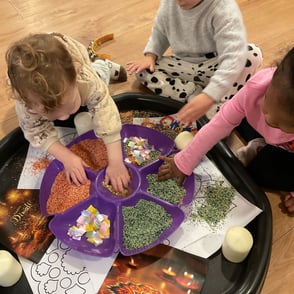I’m a keen subscriber to Psychology Today and wanted to highlight Amanda Ann Gregory’s latest on developmental trauma. It’s a touchy subject because it discusses the long-term impact that we, as parents and care givers, can have on our child’s current and future psycho-social stability, but an important one if we are to do what I think all parents want to: the right thing by our children.
Most parents will know about attachment theory if they've read any parenting books. A concept developed by British psychologist and psychoanalyst John Bowlby, it posited that children, in infancy, develop intimate bonds with a primary care-giver from whom they derive a sense of security that lasts through to adulthood. To put it simply, children who feel loved and protected by an active and present parent grow into happier and more confident adults. Or so the theory goes, which is one of the main reasons why, at nursery, we attempt to emulate that primary care-giving role through our key person system.
Upon first review of Amanda's article, most of us will think none of it applies to us or our children - developmental trauma, after all, is about significant traumatic events (abuse and / or neglect) and none of us would like to think that we could be guilty of impacting our children in that way. But I was struck by the first point of Fear of Abandonment and how that may come about, specifically with regards to "inconsistent care", which can be both physical or emotional. We can be both physically present whilst being emotionally absent and it is to this point that Amanda's article got me thinking about my own life and how it can impact my ability to be the parent I want to be for my children.
Most parents I speak to struggle with the conflict between being a parent and a professional. It is, at least to me, clearly linked to the rise of 24/7 communications - being connected to everything and everyone all of the time can leave you with little time or space to connect to the people who genuinely need us to connect with them, be it our community, our friends or our family in particular. And that's backed up by extant research - Pew uncovered that over two thirds of parents today believe parenting is more difficult than 20 years ago, despite having all of the benefits of technology.
But it is, at least to me, becoming increasingly important for us to find that time by switching off and focussing our time, energy and emotional availability to our children when they are with us and we with them. They deserve it and need it, as much as we do, which is why the French instituted a law in 2016 to ban any corporate communications outside of working hours. But I'm not sure that goes far enough - the constancy and ubiquity of news, content and distractions on our phones and computers not only pulls us away from our children, but ourselves. And, if anything, Amanda's article should help us all understand the implications of what can happen if we don't learn to switch off and refocus our energy and attention to where and who we should. I for one am going to try.

22-Aug-2022 22:01:50
Related Articles




Write a Comment